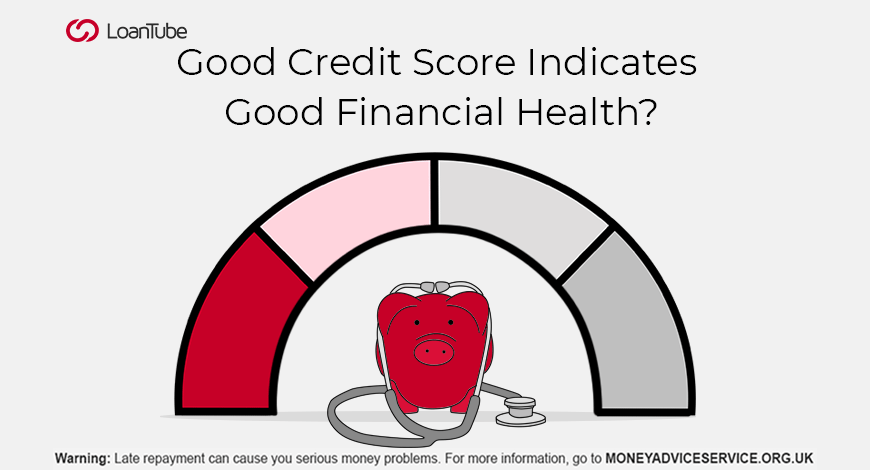A good credit score can improve your creditworthiness and help you get approved for credit. But does it guarantee a good overall Financial Health? Find out what factors contribute towards your financial well being.
Personal finance is how you manage your finances in accordance with your present expenditures, as well as all future expenses. While several factors contribute towards good financial health, efficiently managed personal finances play a significant role. Another factor that contributes towards your financial health, is your credit score, which is majorly determined based on your credit and repayment history.
However, does a good credit score translate to good financial health?
We’ve done a detailed analysis to help you understand the difference better.
Maximise your options: Compare and apply for loans below with LoanTube
Apply Filters
What impact does your credit score have on your financial health?
Your credit score is a three-digit number determined by Credit Bureaus, based on which lenders and creditors assess your creditworthiness. Credit Bureaus evaluate your personal information, credit history, credit inquiries as well as legal judgments, to calculate your credit score.
Lenders use this score to check your reliability to repay the loan. Therefore, if you have a poor credit report, you’ll most likely have a low credit score and come across as ‘risky’ and unreliable. So they might reject your application for loan or credit altogether in the worst-case scenario.
It is important to maintain a healthy credit score in order to get better offers available in the loan market. If you maintain a decent credit score, you will not just be eligible for loans, but you might also find offers with reasonable interest rates. On the contrary, if your credit score is below average, you may find loan offers, but at exorbitant interest rates.
Advantages of having a good credit score
While you can still find loan offers on bad credit, the high-interest rates make take a toll on your budget. On the other hand, a good credit score fetched you the best offers on the table and makes your financial life easier. To motivate you in maintaining a healthy score, we’ve outlined some perks of having a good credit score:
- The low-interest rates on loans and credit cards will help you save a lot of money.
- A good credit score boosts your chances of approval for loans and credit cards.
- A higher credit score will give you leverage over the lender to negotiate for low-interest rates.
- A good credit score may qualify you for a higher credit borrowing limit.
- You may be eligible for better deals on vehicular insurance.
- You might not have to pay security deposits on utilities, which could sometimes amount to £200.
So while a good credit score can undoubtedly ascertain your approval for loans and credit, it only covers a part of your financial wellbeing. Therefore, a good credit score does not ensure good financial health.
Considering a holistic view of your financial health
In a holistic view, several aspects are surrounding your financial health, one of which is your credit score. For maintaining a good overall financial health, you need to keep the following aspects associated with it in check:
- Your Income: A good income is an indicator of financial success and wellbeing. To increase your income, you could enrol yourself in certification courses or training to attain a higher position at your organization. Alternatively, you could find a side hustle that allows you to follow your passion while making money, outside of the 9-5 schedule.
- Percentage of your Income contributing towards fixed expenses: The ratio of your monthly income and your fixed monthly expenditure is a significant factor in determining your financial health. Having a strong ratio will allow you to use your disposable income more efficiently.
- Percentage of income contributing towards your retirement pot: Saving up money for your retirement while you’re still working is a strong game plan. Having a good credit score during your retirement wouldn’t hold as much value then, as having a substantial amount of money in the bank, to help you sustain your later years would. Financial experts recommend saving at least 15% of your income from 25 years onwards.
- Your Net worth: Your net worth is calculated by evaluating the market value of your assets, minus any outstanding debt that you owe. The more you owe, the more your net worth will decline. Therefore, you could borrow money with a good credit score, but it’ll have a negative impact on your net worth, and in turn, on your overall financial health.
- An emergency fund: Aside from your savings, you should have an emergency fund to last you for at least 6 months without your income. This fund should cover necessities like housing, food, transportation as well as healthcare.
Tips to maintain good financial health
- Plan your spending: Keep a track of your bank balance and all the expenditures.
- Spend wisely: Stick to a budget per your monthly income and fixed expenditures.
- Save money: Try to save any discretionary income left after paying you taxes and keeping aside money for all fixed expenditures.
- Borrow wisely: If you need to take out a loan, shop around for a better deal before accepting an offer. Compare loans from multiple lenders based on Real Interest Rates, with us. You can also see your acceptance rate, everything with just a single application form.
- Think ahead: Plan and save for an emergency fund for an unprecedented event that could potentially shake your financial stability.
- Plan a blissful retirement: Keep aside some saving each month that would contribute towards your retirement money.
In conclusion, managing your money in a way that promotes good financial health is also going to help you maintain a healthy credit score. Once you ensure that you’re financially resilient, your credit score will automatically fall into place. However, just having a good credit score won’t ascertain financial wellbeing. Therefore, it is imperative to take all factors of one’s financial health and wellbeing into consideration. Post that devise a plan to improve it.


